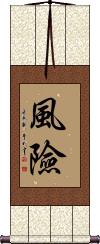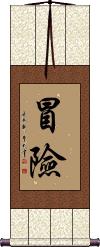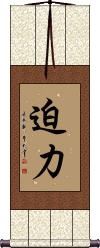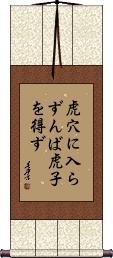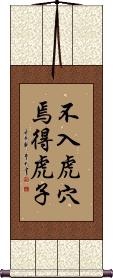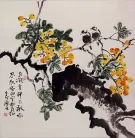Many custom options...
And formats...

Take Risk in Chinese / Japanese...
Buy a Take Risk calligraphy wall scroll here!
Personalize your custom “Take Risk” project by clicking the button next to your favorite “Take Risk” title below...
Risk / Venture
風險 is the Chinese word that means risk or venture.
風險 is mostly used in the context of a business venture or the risk you might take on the stock market.
If you like to gamble on the stock market or “let it all hang out” when doing business transactions, this might be the wall scroll for you.
Adventure
冒險 is another Chinese and Korean word for “Adventure.”
This is more of a “risk-taking” version of adventure.
The first character can mean “brave” and “bold.” The second character means “dangerous” and “rugged.” Together they can be defined as a word meaning “adventure” in Chinese and Korean.
Note: Some dictionaries translate these two characters as “take a risk.”
Gutsy / Daring / Bold
迫力 is a Chinese word that is a form of personal strength.
It is a word that describes a person who is willing to take a risk. In English, we might say, “Someone with guts.”
An example might be a person that is not rich but invests a lot of money into something (knowing they could double their money or lose it all). Win or lose, this is a person that knows or pushes their potential.
Tearing this word apart, the first character means “to compel,” urgent, urge, force, imminent, or “spur on.” The second means power, strong, bear, or exert.
Note: 迫力 is also a word in Japanese Kanji and Korean Hanja but with a meaning more like force, intensity, appeal, strength, impact, force, or simply power.
Undaunted After Repeated Setbacks
Persistence to overcome all challenges
百折不撓 is a Chinese proverb that means “Be undaunted in the face of repeated setbacks.”
More directly translated, it reads, “[Overcome] a hundred setbacks, without flinching.” 百折不撓 is of Chinese origin but is commonly used in Japanese and somewhat in Korean (same characters, different pronunciation).
This proverb comes from a long, and occasionally tragic story of a man that lived sometime around 25-220 AD. His name was Qiao Xuan, and he never stooped to flattery but remained an upright person at all times. He fought to expose the corruption of higher-level government officials at great risk to himself.
Then when he was at a higher level in the Imperial Court, bandits were regularly capturing hostages and demanding ransoms. But when his own son was captured, he was so focused on his duty to the Emperor and the common good that he sent a platoon of soldiers to raid the bandits' hideout, and stop them once and for all even at the risk of his own son's life. While all of the bandits were arrested in the raid, they killed Qiao Xuan's son at first sight of the raiding soldiers.
Near the end of his career, a new Emperor came to power, and Qiao Xuan reported to him that one of his ministers was bullying the people and extorting money from them. The new Emperor refused to listen to Qiao Xuan and even promoted the corrupt Minister. Qiao Xuan was so disgusted that in protest, he resigned from his post as minister (something almost never done) and left for his home village.
His tombstone reads “Bai Zhe Bu Nao” which is now a proverb used in Chinese culture to describe a person of strong will who puts up stubborn resistance against great odds.
My Chinese-English dictionary defines these 4 characters as “keep on fighting despite all setbacks,” “be undaunted by repeated setbacks,” and “be indomitable.”
Our translator says it can mean “never give up” in modern Chinese.
Although the first two characters are translated correctly as “repeated setbacks,” the literal meaning is “100 setbacks” or “a rope that breaks 100 times.” The last two characters can mean “do not yield” or “do not give up.”
Most Chinese, Japanese, and Korean people will not take this absolutely literal meaning but will instead understand it as the title suggests above. If you want a single big word definition, it would be indefatigability, indomitableness, persistence, or unyielding.
See Also: Tenacity | Fortitude | Strength | Perseverance | Persistence
How can you catch tiger cubs without entering the lair of the tiger?
Nothing ventured, nothing gained
虎穴に入らずんば虎子を得ず is the Japanese version of an ancient Chinese proverb. 虎穴に入らずんば虎子を得ず is a reminder that you must take risks if you want the reward.
虎穴に入らずんば虎子を得ず is similar to the English proverb, “Nothing ventured, nothing gained.”
Note: Because this selection contains some special Japanese Hiragana characters, it should be written by a Japanese calligrapher.
How can you catch tiger cubs without entering the lair of the tiger?
Nothing ventured, nothing gained
While perhaps no longer politically correct, this Chinese proverb is a reminder that you must take risks if you want rewards.
不入虎穴焉得虎子 is similar to the English proverb, “Nothing ventured, nothing gained.”
The literal word order of the Chinese is, “If (you) don't enter the tiger's lair/cave, how can (you) get/obtain tiger cubs?.”
This in-stock artwork might be what you are looking for, and ships right away...
Gallery Price: $268.00
Your Price: $148.88
Not the results for take risk that you were looking for?
Below are some entries from our dictionary that may match your take risk search...
| Characters If shown, 2nd row is Simp. Chinese |
Pronunciation Romanization |
Simple Dictionary Definition |
冒す see styles |
okasu おかす |
(transitive verb) (1) to brave; to risk; to face; to venture; (transitive verb) (2) (of a disease, chemical, etc.) to harm; to afflict; to affect; (transitive verb) (3) to desecrate; to profane; (transitive verb) (4) to assume (someone else's surname); to take |
對賭 对赌 see styles |
duì dǔ dui4 du3 tui tu |
to place a bet (with sb); to take a risk (with one's time and effort etc, e.g. on a business venture) |
強攻 强攻 see styles |
qiáng gōng qiang2 gong1 ch`iang kung chiang kung kyoukou / kyoko きょうこう |
(military) to take by storm (noun, transitive verb) forced attack; risk-taking attack; aggressive attack |
找死 see styles |
zhǎo sǐ zhao3 si3 chao ssu |
to court death; to take a big risk |
懸ける see styles |
kakeru かける |
(transitive verb) (1) (kana only) to hang (e.g. picture); to hoist (e.g. sail); to raise (e.g. flag); (2) (kana only) to sit; (3) (kana only) to take (time, money); to expend (money, time, etc.); (4) (kana only) to make (a call); (5) (kana only) to multiply; (6) (kana only) to secure (e.g. lock); (7) (kana only) to put on (glasses, etc.); (8) (kana only) to cover; (9) (kana only) to burden someone; (10) (kana only) to apply (insurance); (11) (kana only) to turn on (an engine, etc.); to set (a dial, an alarm clock, etc.); (12) (kana only) to put an effect (spell, anaesthetic, etc.) on; (13) (kana only) to hold an emotion for (pity, hope, etc.); (14) (kana only) to bind; (15) (kana only) to pour (or sprinkle, spray, etc.) onto; (16) (kana only) to argue (in court); to deliberate (in a meeting); to present (e.g. idea to a conference, etc.); (17) (kana only) to increase further; (18) (kana only) to catch (in a trap, etc.); (19) (kana only) to set atop; (20) (kana only) to erect (a makeshift building); (21) (kana only) to hold (a play, festival, etc.); (22) (kana only) to wager; to bet; to risk; to stake; to gamble; (suf,v1) (23) (kana only) to be partway doing ...; to begin (but not complete) ...; to be about to ...; (24) (kana only) indicates (verb) is being directed to (someone) |
掛ける see styles |
kakeru かける |
(transitive verb) (1) (kana only) to hang (e.g. picture); to hoist (e.g. sail); to raise (e.g. flag); (2) (kana only) to sit; (3) (kana only) to take (time, money); to expend (money, time, etc.); (4) (kana only) to make (a call); (5) (kana only) to multiply; (6) (kana only) to secure (e.g. lock); (7) (kana only) to put on (glasses, etc.); (8) (kana only) to cover; (9) (kana only) to burden someone; (10) (kana only) to apply (insurance); (11) (kana only) to turn on (an engine, etc.); to set (a dial, an alarm clock, etc.); (12) (kana only) to put an effect (spell, anaesthetic, etc.) on; (13) (kana only) to hold an emotion for (pity, hope, etc.); (14) (kana only) to bind; (15) (kana only) to pour (or sprinkle, spray, etc.) onto; (16) (kana only) to argue (in court); to deliberate (in a meeting); to present (e.g. idea to a conference, etc.); (17) (kana only) to increase further; (18) (kana only) to catch (in a trap, etc.); (19) (kana only) to set atop; (20) (kana only) to erect (a makeshift building); (21) (kana only) to hold (a play, festival, etc.); (22) (kana only) to wager; to bet; to risk; to stake; to gamble; (suf,v1) (23) (kana only) to be partway doing ...; to begin (but not complete) ...; to be about to ...; (24) (kana only) indicates (verb) is being directed to (someone) |
鋌而走險 铤而走险 see styles |
tǐng ér zǒu xiǎn ting3 er2 zou3 xian3 t`ing erh tsou hsien ting erh tsou hsien |
to take a risk out of desperation (idiom) |
危険を冒す see styles |
kikenookasu きけんをおかす |
(exp,v5s) to brave a danger; to take a risk |
リスクテーク see styles |
risukuteeku リスクテーク |
(noun/participle) risk-taking (wasei: risk take); taking risks |
リスクテイク see styles |
risukuteiku / risukuteku リスクテイク |
(noun/participle) risk-taking (wasei: risk take); taking risks |
危険をおかす see styles |
kikenookasu きけんをおかす |
(exp,v5s) to brave a danger; to take a risk |
虎の尾を踏む see styles |
toranooofumu とらのおをふむ |
(exp,v5m) (idiom) to play with fire; to take a great risk; to step on a tiger's tail |
リスク・テーク |
risuku teeku リスク・テーク |
(noun/participle) risk-taking (wasei: risk take); taking risks |
リスク・テイク |
risuku teiku / risuku teku リスク・テイク |
(noun/participle) risk-taking (wasei: risk take); taking risks |
火中の栗を拾う see styles |
kachuunokuriohirou / kachunokuriohiro かちゅうのくりをひろう |
(exp,v5u) (idiom) (orig. from the fable The Monkey and the Cat by Jean de La Fontaine) to take a risk for someone; to endanger oneself for someone; to gather chestnuts from the fire |
不求有功,但求無過 不求有功,但求无过 |
bù qiú yǒu gōng , dàn qiú wú guò bu4 qiu2 you3 gong1 , dan4 qiu2 wu2 guo4 pu ch`iu yu kung , tan ch`iu wu kuo pu chiu yu kung , tan chiu wu kuo |
lit. not aiming to achieve the best possible result, but rather trying to avoid making mistakes (idiom); fig. to take a risk-averse approach |
捨不得孩子套不住狼 舍不得孩子套不住狼 see styles |
shě bù de hái zi tào bù zhù láng she3 bu4 de5 hai2 zi5 tao4 bu4 zhu4 lang2 she pu te hai tzu t`ao pu chu lang she pu te hai tzu tao pu chu lang |
one who is not prepared to risk his child will never catch the wolf (proverb); (fig.) one who is unwilling to take risks will not achieve great things |
Variations: |
kakeru かける |
(transitive verb) (1) (kana only) (See 壁にかける) to hang up (e.g. a coat, a picture on the wall); to let hang; to suspend (from); to hoist (e.g. sail); to raise (e.g. flag); (transitive verb) (2) (kana only) to put on (e.g. a blanket); to put on top of; to cover; to lay; to spread; (transitive verb) (3) (kana only) (See 眼鏡を掛ける) to put on (glasses, etc.); to wear (a necklace, etc.); (transitive verb) (4) (kana only) (See 電話を掛ける) to make (a call); (transitive verb) (5) (kana only) (See 時間を掛ける) to spend (time, money); to expend; to use; (transitive verb) (6) (kana only) (See 塩をかける) to pour (liquid) onto; to sprinkle (powder or spices) onto; to splash; to throw (e.g. water) onto; (transitive verb) (7) (kana only) to turn on (an engine, radio, etc.); to set (a dial, alarm clock, etc.); to put on (a DVD, song, etc.); to use (a device, implement, etc.); (transitive verb) (8) (kana only) (See 迷惑を掛ける) to cause (someone inconvenience, trouble, etc.); to burden (someone); to impose; (transitive verb) (9) (kana only) {math} to multiply (arithmetic operation); (transitive verb) (10) (kana only) (See 鍵を掛ける) to secure (e.g. lock); (transitive verb) (11) (kana only) (See 腰を掛ける) to take a seat; to sit; to rest (something on something else); to support (something on something else); (transitive verb) (12) (kana only) (also as 繋ける) to bind; (transitive verb) (13) (kana only) (See 賭ける・かける) to wager; to bet; to risk; to stake; to gamble; (transitive verb) (14) (kana only) to put an effect (spell, anaesthetic, etc.) on; (transitive verb) (15) (kana only) to hold (a play, festival, etc.); (transitive verb) (16) (kana only) to hold an emotion for (pity, hope, etc.); (transitive verb) (17) (kana only) (See 裁判に掛ける) to argue (in court); to deliberate (in a meeting); to present (e.g. idea to a conference, etc.); (transitive verb) (18) (kana only) to increase further; (transitive verb) (19) (kana only) to catch (in a trap, etc.); (transitive verb) (20) (kana only) to set atop; (transitive verb) (21) (kana only) to erect (a makeshift building); (transitive verb) (22) (kana only) (See 保険を掛ける・1) to apply (insurance); (transitive verb) (23) (kana only) (See 掛詞) to pun (on a word); to use (a word) as a pivot word; to play on words; (suf,v1) (24) (kana only) (after -masu stem of verb) (See 話し掛ける・2,治りかける) to be partway doing ...; to begin (but not complete) ...; to be about to ...; (suf,v1) (25) (kana only) (after -masu stem of verb; indicates an action is being directed to someone) (See 話し掛ける・1) to address (someone); to direct (something, to someone); to do (something, to someone) |
明知山有虎,偏向虎山行 |
míng zhī shān yǒu hǔ , piān xiàng hǔ shān xíng ming2 zhi1 shan1 you3 hu3 , pian1 xiang4 hu3 shan1 xing2 ming chih shan yu hu , p`ien hsiang hu shan hsing ming chih shan yu hu , pien hsiang hu shan hsing |
lit. to willfully go towards the mountain although knowing that it has tigers (idiom); fig. to take a risk despite knowing the dangers |
Variations: |
kikenookasu きけんをおかす |
(exp,v5s) to brave a danger; to take a risk |
Variations: |
kakeru かける |
(transitive verb) (1) (kana only) (See 壁にかける) to hang up (e.g. a coat, a picture on the wall); to let hang; to suspend (from); to hoist (e.g. sail); to raise (e.g. flag); (transitive verb) (2) (kana only) to put on (e.g. a blanket); to put on top of; to cover; to lay; to spread; (transitive verb) (3) (kana only) (See 眼鏡を掛ける) to put on (glasses, etc.); to wear (a necklace, etc.); (transitive verb) (4) (kana only) (See 電話を掛ける) to make (a call); (transitive verb) (5) (kana only) (See 時間を掛ける) to spend (time, money); to expend; to use; (transitive verb) (6) (kana only) (See 塩をかける) to pour (liquid) onto; to sprinkle (powder or spices) onto; to splash; to throw (e.g. water) onto; (transitive verb) (7) (kana only) to turn on (an engine, radio, etc.); to set (a dial, alarm clock, etc.); to put on (a DVD, song, etc.); to use (a device, implement, etc.); (transitive verb) (8) (kana only) (See 迷惑を掛ける) to cause (someone inconvenience, trouble, etc.); to burden (someone); to impose; (transitive verb) (9) (kana only) {math} to multiply (arithmetic operation); (transitive verb) (10) (kana only) (See 鍵を掛ける) to secure (e.g. lock); (transitive verb) (11) (kana only) (See 腰を掛ける) to take a seat; to sit; to rest (something on something else); to support (something on something else); (transitive verb) (12) (kana only) (also as 繋ける) to bind; (transitive verb) (13) (kana only) (See 賭ける・かける) to wager; to bet; to risk; to stake; to gamble; (transitive verb) (14) (kana only) to put an effect (spell, anaesthetic, etc.) on; (transitive verb) (15) (kana only) to hold (a play, festival, etc.); (transitive verb) (16) (kana only) to hold an emotion for (pity, hope, etc.); (transitive verb) (17) (kana only) (See 裁判に掛ける) to argue (in court); to deliberate (in a meeting); to present (e.g. idea to a conference, etc.); (transitive verb) (18) (kana only) to increase further; (transitive verb) (19) (kana only) to catch (in a trap, etc.); (transitive verb) (20) (kana only) to set atop; (transitive verb) (21) (kana only) to erect (a makeshift building); (transitive verb) (22) (kana only) (See 保険を掛ける・1) to apply (insurance); (transitive verb) (23) (kana only) (See 掛詞) to pun (on a word); to use (a word) as a pivot word; to play on words; (suf,v1) (24) (kana only) (after -masu stem of verb) (See 話し掛ける・2) to be partway doing ...; to begin (but not complete) ...; to be about to ...; (suf,v1) (25) (kana only) (after -masu stem of verb; indicates an action is being directed to someone) (See 話し掛ける・1) to address (someone); to direct (something, to someone); to do (something, to someone) |
Variations: |
toranooofumu(虎no尾o踏mu, torano尾o踏mu); toranooofumu(torano尾o踏mu) とらのおをふむ(虎の尾を踏む, とらの尾を踏む); トラのおをふむ(トラの尾を踏む) |
(exp,v5m) (idiom) to play with fire; to do something very dangerous; to take a great risk; to step on a tiger's tail |
Variations: |
risukuteiku; risukuteeku; risuku teiku; risuku teeku / risukuteku; risukuteeku; risuku teku; risuku teeku リスクテイク; リスクテーク; リスク・テイク; リスク・テーク |
(noun/participle) risk-taking (wasei: risk take); taking risks |
The following table may be helpful for those studying Chinese or Japanese...
| Title | Characters | Romaji (Romanized Japanese) | Various forms of Romanized Chinese | |
| Risk Venture | 風險 风险 | fēng xiǎn feng1 xian3 feng xian fengxian | feng hsien fenghsien |
|
| Adventure | 冒險 冒险 | mào xiǎn / mao4 xian3 / mao xian / maoxian | mao hsien / maohsien | |
| Gutsy Daring Bold | 迫力 | hakuryoku | pò lì / po4 li4 / po li / poli | p`o li / poli / po li |
| Undaunted After Repeated Setbacks | 百折不撓 百折不挠 | hyaku setsu su tou hyakusetsusutou hyaku setsu su to | bǎi zhé bù náo bai3 zhe2 bu4 nao2 bai zhe bu nao baizhebunao | pai che pu nao paichepunao |
| How can you catch tiger cubs without entering the lair of the tiger? | 虎穴に入らずんば虎子を得ず | koketsu ni haira zun ba tora ko o e zu | ||
| How can you catch tiger cubs without entering the lair of the tiger? | 不入虎穴焉得虎子 | bú rù hǔ xué yān dé hǔ zǐ bu2 ru4 hu3 xue2 yan1 de2 hu3 zi3 bu ru hu xue yan de hu zi buruhuxueyandehuzi | pu ju hu hsüeh yen te hu tzu pujuhuhsüehyentehutzu |
|
| In some entries above you will see that characters have different versions above and below a line. In these cases, the characters above the line are Traditional Chinese, while the ones below are Simplified Chinese. | ||||
Successful Chinese Character and Japanese Kanji calligraphy searches within the last few hours...
